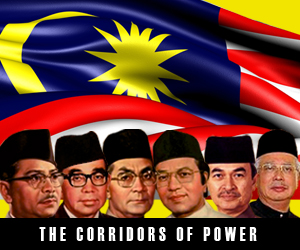How strong are Mahathir’s 1 million signatures?
Mahathir says he has received one million signatures in his petition asking for Najib to be ousted from power. One million signatures out of 30 million Malaysians on an anti-Najib petition is less than the four million signatures out of 70 million on an anti-Brexit petition. And it is even smaller when you consider that only 300,000 signatures on the anti-Najib petition are genuine while the rest are all fakes.
THE CORRIDORS OF POWER
Raja Petra Kamarudin
The EU Referendum Act received Royal Assent in December 2015. The Act was scrutinised and debated in Parliament during its passage and agreed by both the House of Commons and the House of Lords.
The Act set out the terms under which the referendum would take place, including provisions for setting the date, franchise and the question that would appear on the ballot paper. The Act did not set a threshold for the result or for minimum turnout.
As the Prime Minister made clear in his statement to the House of Commons on 27 June, the referendum was one of the biggest democratic exercises in British history with over 33 million people having their say. The Prime Minister and Government have been clear that this was a once in a generation vote and, as the Prime Minister has said, the decision must be respected.
We must now prepare for the process to exit the EU and the Government is committed to ensuring the best possible outcome for the British people in the negotiations.
That was the statement released by the UK government yesterday when it rejected the four-million-signature petition for the Brexit Referendum to be discarded. Basically, they wanted a new or second Referendum to be held where you need at least 60% votes for it to pass plus a 75% voter turnout (and not 52% votes and a 72% turnout like last month).
The British Prime Minister is personally against Brexit. Yet he rejected the anti-Brexit petition. In fact, immediately after the results were announced, David Cameron called for a press conference and told the nation that he is giving three months notice and is going to leave in September. Britain is now in the process of choosing its new Prime Minister.
Nevertheless, it is not 65 million British citizens who are choosing their new Prime Minister. It is not even the roughly 40 million or so registered voters. Those in the process of choosing the new Prime Minister are slightly over 50% of the 650 Members of Parliament. This means about 330 Conservative Party MPs are deciding who should become the Prime Minister on behalf of more than 65 million people.
And that brings us to Malaysia, which has adopted the same British Westminster system of government. Tun Dr Mahathir Mohamad says he has received one million signatures in his petition asking for Najib to be ousted from power. One million signatures out of 30 million Malaysians on an anti-Najib petition is less than the four million signatures out of 65 million British on an anti-Brexit petition. And it is even smaller when you consider that only 300,000 signatures on the anti-Najib petition are genuine while the rest are all fakes.
Britain is supposed to be the paragon of democracy. Yet, in Britain, the British Prime Minister and his ruling party are doing exactly what Najib and Umno are doing. Mahathir, however, says that Najib and Umno are not democratic, etc. So which system does Mahathir want Malaysia to follow? Well, what Mahathir wants is a Malaysian Spring à la the Arab Spring that has now resulted in the birth of the Islamic State, ISIS, ISIL, etc. Mahathir wants a change of government outside the constitutional process.
The problem is not Najib, Umno or Barisan Nasional. The problem is Malaysia is using the same political system that the UK is using. And Malaysia is doing exactly what the UK is doing. If Mahathir does not like that system then he should propose that Malaysia discards the UK system in favour of the US system. Then the Prime Minister will have to stand for elections and get voted into office and not get appointed because his party happens to have more seats in Parliament — like in the UK.


